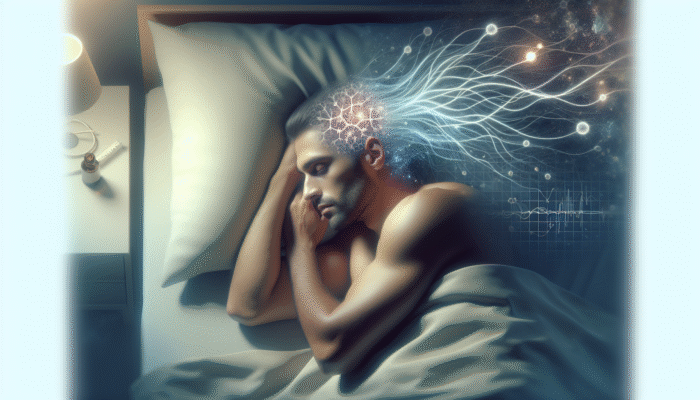Uncover the Vital Relationship Between Sleep Quality and Hair Health
Understanding how sleep affects hair quality is crucial for anyone looking to improve their overall well-being. Sleep is a vital time for our bodies to rejuvenate and heal, where essential restorative processes occur. By exploring the intricate link between sleep and hair health, individuals can refine their hair care routines and embrace a holistic approach to wellness. Recognising this connection empowers people to implement effective strategies to enhance hair vitality, highlighting the importance of prioritising quality sleep as a fundamental aspect of personal grooming and self-care.
Delving into Hair Growth Cycles and the Influence of Sleep

The human body functions through a series of complex biological cycles, including those that dictate hair growth. The anagen phase, which is the active growth period of hair follicles, is significantly affected by sleep patterns. During deep sleep, our bodies release essential growth hormones that are vital for cellular regeneration and repair. This crucial restorative process not only supports existing hair but also stimulates the formation of new hair follicles, thereby emphasising the essential role of restful sleep in maintaining healthy hair.
Research has shown that disrupted sleep can lead to a shortened anagen phase, resulting in weakened hair growth. Across various cultures worldwide, from the calm villages of Japan to the bustling streets of New York, there is a growing recognition of the importance of quality sleep for sustaining healthy hair. By prioritising sleep, individuals can effectively promote longer and healthier hair growth, allowing their hair to shine with vitality and strength.
How Quality Sleep Regulates Hormones for Optimal Hair Health
Achieving restorative sleep is paramount for regulating the hormones that directly impact hair health. Cortisol, often referred to as the stress hormone, can have harmful effects on our hair follicles when its levels are elevated due to insufficient sleep. High cortisol levels are frequently associated with increased hair loss and thinning. On the other hand, melatonin, known as the sleep hormone, plays a crucial role in supporting hair growth and ensuring overall scalp health, thereby highlighting the significance of balanced sleep in nurturing hair vitality.
Across the globe, numerous techniques are employed to enhance sleep hygiene and effectively balance these hormones. Methods such as mindfulness meditation, yoga, and the consumption of herbal teas can significantly lower stress levels. This harmonious hormonal balance not only boosts hair health but also supports emotional well-being, promoting a holistic approach to self-care that benefits both hair and mental health.
What Are the Consequences of Sleep Deprivation on Hair Loss?
The ramifications of sleep deprivation extend far beyond mere fatigue; they have a profound impact on hair quality. Insufficient sleep leads to increased levels of adrenaline and cortisol, both of which can trigger excessive hair shedding. Numerous studies indicate that chronic sleep deprivation can result in noticeable hair thinning, affecting individuals from various cultures and lifestyles, thus underscoring the universal impact of sleep on hair health.
For those grappling with heightened stress, whether due to demanding work environments in bustling cities or personal challenges in quieter settings, recognising the signs of sleep deprivation is essential. Establishing a consistent sleep routine that prioritises adequate rest can be transformative, resulting in healthier, fuller hair. By understanding the crucial link between sleep and hair health, individuals can take proactive measures to protect their hair from the adverse effects of sleepless nights.
Understanding the Direct Connection Between Sleep Quality and Hair Strength

The strength and resilience of hair are intricately linked to the quality of sleep we experience. It is not solely the duration of sleep that matters; rather, it is the depth and quality of that sleep. Achieving uninterrupted, restorative sleep is vital for optimal hair strength, as this is the period when essential restoration and repair processes occur, allowing hair to regain its vitality and robustness.
How Does Adequate Deep Sleep Boost Hair Resilience?
Deep sleep is a rare and critical phase that allows the body to engage in vital repair processes, including strengthening hair. During this essential period, the rate of protein synthesis increases, a necessary action for creating keratin, the primary structural protein in hair. Enhanced protein production during deep sleep results in thicker, stronger hair strands, reducing their susceptibility to breakage and damage, thereby underscoring the importance of deep sleep for overall hair vitality.
Globally, various techniques aimed at improving the quality of deep sleep are gaining popularity. From the soothing sounds of nature in tranquil settings to the use of aromatherapy with essential oils, different cultures have developed methods to promote deeper, more restorative sleep. By incorporating these practices into daily routines, individuals can significantly enhance their hair health, ensuring that each strand is fortified and resilient against environmental stressors.
What Role Does REM Sleep Play in Enhancing Hair Elasticity and Strength?
Rapid Eye Movement (REM) sleep, another critical phase in the sleep cycle, is essential for comprehensive recovery. This stage is characterised by increased brain activity and vivid dreaming, playing a pivotal role in bodily recovery processes that indirectly enhance hair strength and elasticity. During REM sleep, various physiological processes support tissue recovery and hormonal balance, both of which are crucial for maintaining healthy hair.
During this phase, the body replenishes essential nutrients necessary for sustaining elasticity and preventing hair brittleness. Individuals from diverse regions, whether surrounded by the lush greenery of the Amazon rainforest or the snowy landscapes of the Alps, increasingly recognise the importance of optimising their sleep cycles to enhance hair health. By understanding the link between REM sleep and hair vitality, individuals can take meaningful steps to improve both their sleep quality and hair health.
Tackling Hair Fragility Associated with Sleep Disorders
Conditions such as insomnia can have a severely adverse effect on hair health, rendering it more fragile and susceptible to damage. The stress associated with sleep disorders can lead to hormonal imbalances, increasing the risk of hair breakage and split ends. Individuals suffering from insomnia often find themselves trapped in a detrimental cycle where heightened stress exacerbates their sleep challenges and negatively impacts hair quality.
Globally, approaches to addressing sleep disorders vary widely, ranging from traditional herbal remedies in Asian cultures to modern therapeutic techniques in urban settings. By tackling the underlying causes of sleep disorders, individuals can not only improve their sleep quality but also make significant strides in enhancing their hair’s resilience and overall health, thereby fostering a more balanced lifestyle.
The Critical Duo of Nutrition and Sleep for Enhancing Hair Vitality
The interplay between nutrition and sleep is vital in supporting and enhancing hair vitality. While the body utilises sleep as a time for repair and rejuvenation, this restorative process heavily depends on the availability of essential nutrients. A balanced diet, combined with quality sleep, can profoundly influence hair health, making it imperative to focus on both elements for optimal results.
Understanding the Importance of Nutrient Absorption During Sleep for Hair Health
Sleep plays a crucial role in nutrient absorption, facilitating essential repair processes that are critical for maintaining healthy hair. During sleep, the digestive system operates at its highest efficiency, allowing the body to absorb vital nutrients, including proteins, vitamins, and minerals that are indispensable for supporting hair strength and growth. This emphasises the necessity of both sleep and a balanced diet to achieve vibrant hair health.
Various cultures worldwide highlight the significance of a balanced diet to optimise hair health. For instance, Mediterranean diets, rich in vitamins A, C, and E, are celebrated for their positive effects on hair vitality. By complementing these dietary habits with quality sleep, individuals can significantly enhance nutrient absorption, creating a powerful synergy that promotes vibrant, healthy hair.
How Do Sleep and Vitamin D Levels Interconnect for Hair Health?
Vitamin D is essential for maintaining healthy hair follicles, and sufficient sleep is vital for sustaining optimal levels of this nutrient. Research indicates that disrupted sleep patterns can lead to fluctuations in vitamin D levels, adversely affecting hair growth and overall health. This connection highlights the intertwined relationship among sleep, nutrition, and hair vitality, underscoring the importance of managing all three.
Individuals from different environments, whether basking under the sunny skies of Australia or enduring the gloomy winters of Northern Europe, must recognise the dual importance of sunlight exposure and quality sleep in maintaining their vitamin D levels. By integrating sleep hygiene practices alongside a diet rich in vitamin D, individuals can empower themselves to take charge of their hair health and overall well-being.
What Is the Critical Role of Hydration in Sleep Quality and Hair Health?
Hydration serves as a fundamental link between sleep and hair health. Maintaining adequate hydration levels ensures that the body can perform essential functions during sleep, including the maintenance of healthy hair. Dehydration can lead to dry, brittle hair, making it more susceptible to damage and breakage, thereby highlighting the necessity of adequate water intake for sustaining hair vitality.
Globally, hydration practices vary widely, from traditional herbal teas to innovative water infusions. By prioritising hydration and ensuring restful sleep, individuals can significantly enhance the shine and health of their hair, cultivating a radiant appearance that reflects their overall wellness and vitality.
How to Optimise Sleep for Enhanced Hair Growth Cycles
Quality sleep is fundamental in supporting the anagen phase of hair growth, which is essential for achieving longer, healthier hair strands. The interplay between sleep quality and hair growth cycles is a vital aspect of hair health that should not be underestimated. Individuals worldwide, from busy urban dwellers to those in serene rural areas, should consider their sleep patterns in relation to their hair care routines.
By fostering good sleep hygiene, people can optimise their hair's growth potential, ensuring their locks thrive in harmony with their overall health. A conscious approach to sleep can lead to significant improvements in hair vitality, making it a key focus for anyone seeking to enhance their hair care practices.
Integrating Effective Sleep Hygiene into Your Hair Care Routine
Establishing a strong connection between sleep hygiene and hair care routines can significantly amplify the benefits that quality sleep brings to hair health. This synergy is essential for maximising the restorative effects of sleep on hair quality, making it imperative to evaluate how one’s nightly rituals can contribute to hair vitality.
How to Craft a Nighttime Hair Care Routine for Optimal Results
Creating a consistent hair care routine before bedtime can significantly enhance the benefits of sleep on hair health. By engaging in a structured regimen that includes gentle cleansing and conditioning, individuals can foster the perfect environment for optimal hair repair during sleep. This proactive approach to hair care can yield profound long-term effects on hair vitality.
In various cultures, nighttime rituals often incorporate natural oils and treatments to nourish hair. For example, coconut oil is a popular choice in tropical regions, whereas argan oil is preferred in Moroccan traditions. These time-honoured practices, when combined with a commitment to quality sleep, can substantially enhance hair health and resilience, forming a holistic beauty regimen.
Choosing the Right Protective Hairstyles for Sleep to Minimise Damage
Selecting the appropriate hairstyle for sleep is crucial in preventing damage and encouraging healthy hair growth. Loose braids or buns can significantly reduce friction and protect hair from breakage during sleep, making them ideal choices for nighttime wear. This simple adjustment can lead to healthier hair and improved growth over time.
Across cultures, individuals have embraced protective styles that not only maintain their hair but also enhance its overall health and well-being. Whether it’s the traditional braiding techniques found in African cultures or the sleek buns favoured in Western traditions, these styles can significantly contribute to healthier hair by minimising stress on the strands overnight. By selecting the right hairstyles, individuals can safeguard their hair while enjoying a restful night's sleep.
How to Design a Sleep Environment That Supports Hair Health
A comfortable sleep environment is essential for reducing hair stress and breakage throughout the night. Factors such as bedding material, room temperature, and even ambient light can significantly influence sleep quality and, consequently, hair health. Creating an ideal sleep setting can lead to improved rest and enhanced hair vitality.
From luxurious silk pyjamas worn during elegant hotel stays to organic cotton sheets appreciated in eco-friendly homes, the materials we choose for our sleep environments can greatly affect our comfort and hair health. By creating a soothing sleep space, individuals can reduce stress on hair while fostering a more restorative sleep experience, leading to healthier and more resilient locks.
What Is the Significance of Pillowcase Material on Hair Quality?
The choice of pillowcase material can significantly impact the reduction of friction and the promotion of healthier hair during sleep. Silk and satin pillowcases, for instance, are renowned for their ability to minimise breakage and maintain moisture levels in hair, fostering a smoother texture. This minor adjustment can have a profound effect on hair quality.
Globally, more individuals are exploring the benefits of these materials, recognising their potential to enhance hair health. By simply upgrading pillowcase materials, people can take a significant step towards improving their hair care routines and overall well-being, making it a worthwhile investment for anyone concerned about hair vitality.
Effectively Managing Stress Through Quality Sleep
The intricate relationship between sleep and stress management plays a crucial role in maintaining healthy hair. Quality sleep helps reduce stress levels, which can otherwise lead to hair loss and deterioration in hair quality. Understanding this connection is essential for anyone looking to improve their hair health.
How to Reduce Stress-Induced Hair Loss Through Quality Sleep
Quality sleep emerges as a powerful ally in managing stress-induced hair loss. When individuals prioritise rest, they reduce cortisol levels, thereby minimising the risk of stress-related hair loss. Recognising the importance of sleep within the broader context of stress management is vital for sustaining hair vitality.
Globally, people are becoming increasingly aware of the role sleep plays in their stress management strategies. From yoga retreats in India to wellness workshops in urban centres, individuals are learning to harness the restorative power of sleep to combat hair loss and ensure their hair remains healthy and vibrant.
What Is the Intricate Connection Between Sleep and Emotional Well-being?
Emotional health is intricately linked to sleep quality, which in turn impacts hair health. Sleep deprivation can lead to feelings of anxiety and depression, exacerbating issues related to hair loss. This connection highlights the need for a comprehensive approach to wellness that incorporates managing emotional well-being.
Across different cultures, time-honoured practices have been established to enhance emotional well-being and promote restful sleep. These rituals, whether through mindfulness meditation, journaling, or community gatherings, foster emotional resilience and, consequently, contribute to healthier hair by nurturing a healthy scalp and hair follicles.
How to Implement Mindfulness Practices to Improve Sleep
Incorporating mindfulness practices before bed can significantly enhance sleep quality, indirectly benefiting hair health. Techniques such as deep breathing, meditation, or gentle stretches can promote relaxation and prepare the body for restorative sleep. These practices not only improve sleep but also enhance overall well-being, creating a positive feedback loop for hair health.
Globally, mindfulness practices are gaining traction, as individuals in both urban and rural settings recognise their capacity to reduce stress and enhance overall health. By embracing these techniques, people can achieve a harmonious balance that supports not only their mental well-being but also their hair vitality, leading to healthier tresses.
What Is the Critical Importance of Sleep Duration for Hair Regrowth?
Ensuring adequate sleep duration is vital for supporting the body's natural hair regrowth processes. When individuals consistently achieve restful sleep, they allow their bodies to undergo necessary repair and rejuvenation, which is integral to maintaining healthy hair. This aspect of sleep is often overlooked, yet it is essential for those striving to improve their hair condition.
In diverse regions, from bustling cities to tranquil countryside, the emphasis on sufficient sleep is gaining momentum. Individuals are discovering that by prioritising sleep duration, they can effectively enhance their hair regrowth processes, counteracting the effects of stress and promoting a healthier mane. This newfound awareness reinforces the vital role that sleep plays in sustaining overall hair health and vitality.
How to Create an Optimal Environment for Quality Sleep
An optimal sleep environment is essential for enhancing sleep quality, which in turn supports overall stress management and hair health. Factors such as temperature, noise levels, and lighting can greatly influence the ability to achieve restful sleep. Understanding these elements is crucial for anyone aiming to improve their hair health through better sleep.
Globally, individuals are becoming increasingly aware of their sleep environments, opting for blackout curtains, white noise machines, and comfortable bedding to establish spaces conducive to relaxation. By optimising their sleep settings, individuals can enhance their overall sleep quality, which positively impacts their hair health, resulting in a more vibrant and healthy appearance.
Understanding the Effects of Aging on Sleep Quality and Hair Vitality
As we age, our hair undergoes various transformations, and sleep quality can significantly influence the alleviation of some of these effects. Prioritising sleep can bolster hair vitality even as we grow older, making it crucial for older adults to focus on this aspect of their health.
How to Mitigate Age-Related Changes in Hair Through Quality Sleep
Quality sleep can help counteract some age-related effects, such as hair thinning and greying. Studies suggest that adequate sleep supports the body's capacity to maintain healthy hair follicles, potentially delaying the onset of greying and thinning. This connection emphasises the significance of sleep in sustaining youthful hair vitality.
From ancient cultures that value the wisdom of restorative sleep to modern wellness movements, there is a universal understanding of the importance of sleep in preserving a youthful appearance. By fostering good sleep practices, individuals can effectively combat the signs of aging and maintain their hair's vibrancy, promoting a positive self-image and confidence.
How to Manage Hormonal Shifts with Age Through Quality Sleep
As we age, hormonal shifts can significantly influence hair quality. Sleep plays a crucial role in balancing these hormonal changes, which can directly benefit hair health. Maintaining a stable hormonal environment is essential for preserving hair strength and fullness, underscoring the importance of quality sleep among older adults.
In various regions, from bustling metropolises in Asia to the serene landscapes of Europe, individuals are seeking natural methods to balance hormones. Practices such as tailored diets, regular exercise, and, of course, good sleep hygiene can profoundly influence hair quality as we navigate the aging process, highlighting the importance of a holistic approach to health.
Supporting Hair Restoration in Older Age Through Quality Sleep
Ensuring adequate sleep supports the body's natural hair restoration processes in older individuals. During sleep, the body engages in essential repair processes vital for maintaining hair health over time. This aspect of sleep is crucial for individuals looking to support their hair as they age.
Globally, aging populations are recognising the importance of quality sleep for hair vitality. By prioritising restorative sleep, older adults can significantly enhance their overall hair health, fostering a sense of renewed confidence and vitality as they embrace the later stages of life. This newfound focus on sleep can lead to profound improvements in hair quality and overall well-being.
The Influence of Lifestyle Factors on Sleep and Hair Health
Lifestyle choices significantly impact the connection between sleep and hair health. From exercise to nutrition, various factors can affect sleep quality and, consequently, the health and vitality of your hair. Understanding these lifestyle factors can guide individuals in making informed decisions that enhance both sleep quality and hair health.
What Is the Role of Exercise in Enhancing Sleep Quality and Hair Vitality?
Regular exercise, combined with sufficient sleep, can significantly influence hair vitality. Engaging in physical activity promotes improved blood circulation, which aids in delivering essential nutrients to hair follicles, thereby supporting healthy growth. This connection between exercise, sleep, and hair health underscores the importance of a holistic approach to personal well-being.
Globally, individuals are increasingly adopting active lifestyles, whether through running, yoga, or group fitness classes. This commitment to regular exercise not only improves physical health but also fosters restful sleep, ultimately benefiting hair quality. By integrating physical activity into their daily routines, individuals can create a positive cycle that enhances both their sleep and hair vitality.
How Does Nutrition Play an Essential Role in Supporting Hair Health and Sleep?
A balanced diet rich in vital vitamins and minerals is essential for promoting hair growth and quality. Nutritional deficiencies can lead to hair loss, making it imperative to ensure that the body receives adequate nutrients for optimal hair health. This relationship highlights the importance of a comprehensive approach to nutrition that supports both hair vitality and sleep quality.
Across cultures, dietary practices vary, but the underlying principle remains consistent: nourishment from whole foods is key. By pairing a nutritious diet with quality sleep, individuals from different backgrounds can make significant strides toward vibrant, healthy hair. This combination of good nutrition and restorative sleep is crucial for anyone seeking to enhance their hair health.
What Are Effective Stress Management Techniques to Safeguard Against Hair Loss?
Chronic stress can significantly contribute to hair loss, making effective stress management techniques essential. Practices such as meditation, yoga, and creative outlets can help alleviate stress and foster a healthier environment for hair growth. Understanding the relationship between stress and hair health is crucial for anyone striving to maintain their hair's vitality.
Globally, cultures have embraced various methods for managing stress, recognising the need for balance in life. By incorporating stress-reduction techniques into their daily routines, individuals can not only improve their mental health but also nurture stronger, healthier hair, creating a more harmonious balance in their lives.
Addressing Frequently Asked Questions About the Connection Between Sleep and Hair Health
In what ways does sleep influence hair growth?
Quality sleep enhances the anagen phase of hair growth, facilitating healthier and longer hair. Sleep promotes hormonal balance and nutrient absorption, both crucial for preserving hair vitality and strength.
Can insufficient sleep lead to hair loss?
Yes, sleep deprivation can elevate cortisol levels, leading to hair thinning and loss. Consistent quality sleep is vital for maintaining hair health and preventing hair loss.
What role does nutrition play in sleep and hair quality?
Nutrition is essential for effective nutrient absorption during sleep. A balanced diet rich in vital vitamins supports healthy hair growth and resilience, which is crucial for maintaining overall hair health.
How can I improve my sleep hygiene to benefit my hair health?
Establish a consistent sleep routine, create a comfortable sleep environment, and minimise distractions to enhance sleep quality, thereby supporting hair health and vitality.
Are there specific hairstyles that protect hair during sleep?
Loose braids or buns can significantly reduce friction and prevent breakage, promoting healthier hair while you sleep and allowing for optimal hair growth.
Does sleep quality impact hair strength?
Absolutely. Deep sleep phases enhance protein synthesis, which contributes to stronger hair strands and reduces the risk of breakage, ultimately leading to healthier hair overall.
What is the relationship between stress management and hair loss?
Chronic stress can trigger hair loss. Effective stress management techniques can help mitigate this effect, promoting healthier, more resilient hair growth.
Can age-related changes in hair be lessened with improved sleep quality?
While not reversible, good sleep can help mitigate some age-related hair changes, aiding in the maintenance of fullness and delaying the onset of greying.
What natural remedies can improve sleep quality?
Practices such as mindfulness, herbal teas, and calming bedtime rituals can significantly enhance sleep quality, benefiting overall health and contributing to hair vitality.
Is proper hydration important for hair health during sleep?
Yes, proper hydration is crucial. It helps maintain moisture levels in hair, promoting a healthier and more lustrous appearance, which is vital for overall hair vitality and health.
Connect with us on Facebook!
The Article: How Sleep Impacts Your Hair Quality: A Universal Guide appeared first on Amitys Hair Salon.
The Article Sleep Impacts Hair Quality: The Ultimate Guide Was Found On https://limitsofstrategy.com

